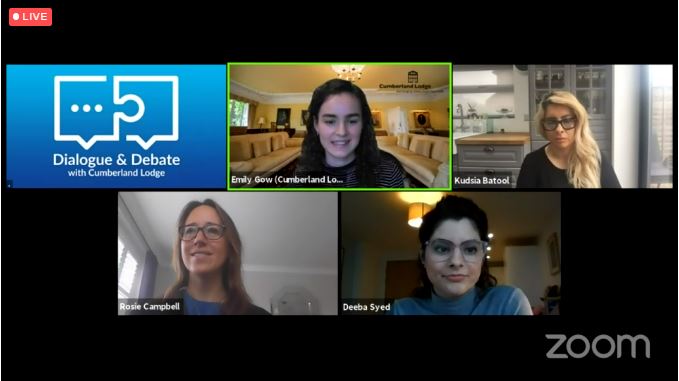To mark International Women’s Day 2021, Cumberland Lodge hosted its March Dialogue & Debate webinar on Women’s Pandemic Perspectives.
Cumberland Lodge’s Programme Officer, Emily Gow welcomed:
- Kudsia Batool – Head of Equalities & Strategy, Trades Union Congress (TUC)
- Rosie Campbell – Professor of Politics and Director of the Global Institute for Women’s Leadership, King’s College London
- Deeba Syed – women’s rights campaigner, activist and employment solicitor; Senior Legal Officer for the Sexual Harassment at Work Advice Line, Rights of Women.
Reversing equality?
The panellists discussed the pandemic’s adverse impacts on women and described how this crisis has exposed and exacerbated structural inequalities that disadvantage women.
The pandemic has had serious social implications. Deeba Syed cited UN Women research that warned that the pandemic could undermine progress towards gender equality. She pointed to the spike in domestic abuse in the UK and around the world.
Importantly, Deeba emphasised that violence against women is not a new problem, saying, ‘misogyny is incredibly adaptive’. Her organisation, Rights of Women, conducted a survey that revealed that online sexual harassment has increased during the pandemic. She highlighted that harassment has also continued, and in many cases worsened, for those who are physically at work, such as key workers. As the panellists pointed out, women are more likely than men to be employed as key workers and to be in precarious forms of employment.
The crisis has economically disadvantaged women. For example, Kudsia Batool and Rosie Campbell highlighted that women’s already disproportionate caring responsibilities have increased with school and childcare closures during the pandemic. Kudsia cited TUC research that many women have been denied access to furlough during school closures. She also pointed out that 70% of those who have been unable to access sick pay are women.
Advancing equality?
With the threat of the pandemic reversing progress towards gender equality in many ways, the panellists reflected on whether there are opportunities for the pandemic to advance women’s position in society, perhaps because of an increasing public awareness of the pandemic’s gendered impacts.
They argued that awareness-raising needs to be matched by policy action. For example, more systematic data collection is needed if we are to understand the full gender implications of the pandemic and other policies. In particular, Kudsia and Deeba criticised the Government for suspending gender pay gap reporting, early on in the pandemic
Rosie and Deeba were cautiously optimistic about the possibility of workplace innovation post-pandemic, to better recognise people’s caring responsibilities and improve flexible working practices. Deeba also pointed to innovations within health services – for example, moves to improve access to sexual and reproductive health services, including a consultation on whether people should be able to buy the contraceptive pill over the counter.

Rosie pointed to the opportunity of the ‘levelling up’ agenda to expand its focus towards ethnicity and gender, and on a greater investment in social justice. Similarly, Deeba referenced the importance of considering intersectionality in policy formation – in this case, the way in which gender inequalities intersect with other forms of inequality.
Rosie argued for the importance of diversity and representation amongst political decision-makers and said that current political institutions are not inclusive enough. She cited her research that found that fewer female MPs have children than male MPs. She praised recent gains towards inclusion, for example the successful campaign for MPs to be able to take maternity leave, but emphasised that much more needs to be done to make political institutions inclusive for carers. Deeba added that there are still serious issues of gender discrimination, including sexual harassment, within politics.

The three panellists emphasised the important role that men should play in advancing gender equality. For example, men should be working to ensure that household tasks are equally distributed, during the pandemic and beyond. Rosie pointed out that there are many men who have taken on additional childcare responsibilities during the pandemic, who could champion the importance of caring roles in society.
Deeba urged men in senior leadership positions to learn directly from the women in their organisations. She also highlighted the importance of combating one of the root causes of violence against women: what she calls ‘negative masculinity’ in which men are expected to meet harmful gendered norms.
Throughout the webinar, members of the online audience were encouraged to submit live questions to the panellists, in response to the discussion. The final audience question asked how women can fight for their rights. Kudsia urged women to join a trade union, and Deeba agreed, reflecting that there were more opportunities for organisation like Rights of Women to support women who are experiencing sexual harassment if they have the collective ‘work insurance’ of a union. Rosie added that women could also consider joining a political party, so that their voices would be heard at every level of decision-making.

‘Choose to Challenge’
The theme for International Women’s Day 2021 (#IWD2021) is ‘Choose to Challenge’ (#ChoosetoChallenge) and the panellists and participants in this webinar challenged government decision-makers, and all of us, to recognise the inequalities around us and work together towards a more equal future.
Importantly, the panellists referenced the potential for the Government’s Budget announcement (that took place shortly after the discussion) to make a difference. Following the Chancellor’s speech, some gender equality campaigners, such as the Women’s Budget Group, called it a ‘missed opportunity’ to address such inequalities – for example, criticising the lack of attention given to childcare. While the increase of funds for domestic abuse services was welcomed, many in the Violence against Women and Girls sector warned that the funding is still insufficient.
It is up to all of us to advance equality in our communities. I was thrilled to help organise this important event. Another way in which I am challenging inequality is though my PhD research, which aims to contribute to the evidence base of gender-based violence in politics and to explore relevant policy frameworks. How will you #ChoosetoChallenge?


